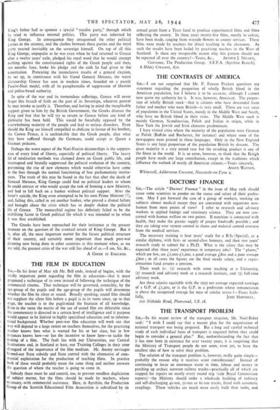THE FILM IN EDUCATION
SIR,—In his letter of May 5th Mr. Bell ends, instead of begins, with the vitally, important point regarding the film in education—that it must propound a techhique of its own instead of follownig the technique of the commercial cinema. That technique will be governed, ostensibly, by the age-group of the pupils and the age-group of the pupils will determine whether the film be silent or sound. Broadly speaking, sound film should not supplant the silent film before a pupil is.in its teens since, up to that stage, the teacher is to the pupil-mind the fountain of all knowledge. Even in the teens the merits of the use of sound film are debatable since the commentary is directed to a certain level of intelligence and it purpose would appear to be limited to highly specialised education and to informa- tional background. Whether post-war film education will work out that way will depend to a large extent on teachers themselves, for the practising teacher knows best what is wanted for his or her class, but in few instances knows how—or has the incentive to know how—to tackle the making of a film. The fault lies with our Universities, our Central Institutions and, in Scotland at least, our Training Colleges in their utter disregard of the importance of the film medium. Mr. Ansley envisages farmed-out State subsidy and State control with the alternative of com- mercial exploitation for the production of teaching films. In practice both of these would probably mean the same thing and neither answers the question of where the teacher is going to come in.
Subsidy there must be and control, too, to prevent needless dupliciition of subject matter, but the films should be made by teachers, where necessary,,with commercial assistance. Here, in Ayrshire, the Production Group of the Scottish Educational Film Association is subsidised by an annual grant from'a Trust fund to produce experimental films and films reflecting the county. In three years twenty-five films, mostly in colour, have been made, ranging from wayside flowers to county services. These films were made by teachers for direct teaching in the classroom. As such the results have been hailed by practising teachers in the West of Scotland. Is there any insuperable reason why this pattern should not


























 Previous page
Previous page